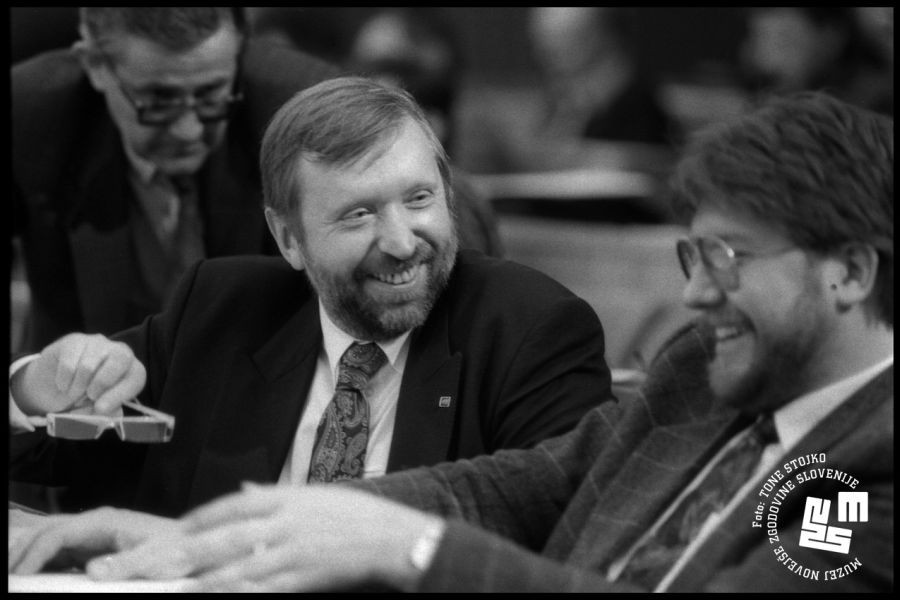9. 5. 1991: Facilitated processing of independence laws
The deputies of all three chambers of the Slovenian assembly – the Socio-political Chamber, the Chamber of Associated Labour and the Chamber of Municipalities – listened to presentations of proposed bills in a joint session. The delegates, as the deputies were called at the time, as there was no separation of the legislative and executive powers, were addressed by Foreign Minister Dimitrij Rupel, Interior Minister Igor Bavčar and Deputy Finance Minister Stanko Debeljak.
This was followed by a separate debate by the chamber of the tricameral assembly, which resulted in a division into two camps. On the one hand there were the parties of the Demos coalition which, because of the approaching date of declaration of national independence, called for a shortened procedure and for the package of independence laws to be passed as soon as possible, and on the other there were the parties of the old and young socialist opposition, which insisted on a regular and, consequently, longer legislative procedure.
European legislative standards
Included as part of the legislation with which Slovenia's sovereignty was expected to be established in regard to the monetary system, including the introduction of its own currency, were bills dealing with the Slovenian national bank, on banks and savings banks, on the agency for insurance of deposits in banks and savings banks, on prices, on customs service, on foreign exchange and on international credit relations. Rupel and Debeljak explained that the bills contained changes that Slovenia had not managed to implement at the federal level so far, and that also taken into account was the experience of the western countries, which would help the Slovenian economy better prepare for the challenges of a market economy.
Bavčar presented bills pertaining to the interior, including the bill on citizenship, on foreigners and on passports. "The objective of these bills is to establish an organisation of the executive branch of power that would work to the general satisfaction of all citizens who accept the citizenship of the Republic of Slovenia as a value," the minister commented on the proposed regulation in this field. He also presented the bill on crossing of the state borders and their protection, which stipulated that the national borders would no longer be protected by units of the Yugoslav People's Army, but by members of the interior affairs bodies. As part of changes to the law on road transport safety, a proposal for new car registration plates and a new driving licence was presented.
Slovenian proposal for regulation of obligations to the federation
After the Slovenian assembly passed the decision to initiate a formal procedure for the splitting of the Republic of Slovenia from the Socialist Federal Republic of Yugoslavia and informed the federal assembly about this, the Slovenian Prime Minister Lojze Peterle addressed a letter to the prime minister of the Yugoslav federal government, Ante Marković, and the prime ministers of the remaining Yugoslav republics with a proposal of principles for the start of a procedure to regulate mutual rights and obligations. Peterle said at a press conference that the letter was an offer from Slovenia for a dialogue, and that the presented principles were a formal basis for negotiations between Slovenia and the federation.
It mainly dealt with the fields of financial obligations and claims, division of non-financial assets, remaining obligations and regulation of the performance and financing of transactions for the Republic of Slovenia. The letter also noted that such an agreement was the only possibility for preventing a chaotic break-up of the Yugoslav economy and a negative reaction by international financial institutions.
Author: Blaž Karlin
Similar articles
-
Triumphant Year of 1991
-
9. 5. 1991: Facilitated processing of independence laws
-
2. 3. 1991: Slovenians abroad and around the world in concern for Slovenia
-
1. 3. 1991: Franco Juri against the transfer of conscripts to the Slovenian Territorial Defence
-
28. 2. 1991: Prepared defence and protection act proposal to ensure a plebiscite decision
-
27. 2. 1991: The persistently looming red star
-
26. 2. 1991: A hopeless search for the Yugoslav modus vivendi
-
16. 2. 1991: Ciril Ribičič on the red star and reservations about the dissolution of Yugoslavia
-
15. 2. 1991: Two thirds of respondents have faith in an independent Slovenia
-
27. 1. 1991: Between a relaxation of tensions at home and a deteriorating situation in the Middle East



